How to protect your wealth as inflation hits new record highs
UK inflation has hit a new record high of 10.1%. It's going to hurt, says Dominic Frisby. Here's how you can protect your wealth.

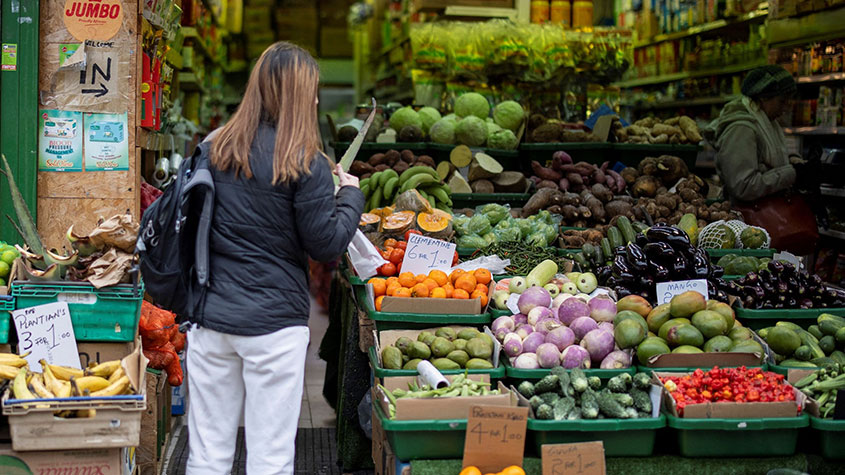
Get the latest financial news, insights and expert analysis from our award-winning MoneyWeek team, to help you understand what really matters when it comes to your finances.
You are now subscribed
Your newsletter sign-up was successful
Want to add more newsletters?

Twice daily
MoneyWeek
Get the latest financial news, insights and expert analysis from our award-winning MoneyWeek team, to help you understand what really matters when it comes to your finances.

Four times a week
Look After My Bills
Sign up to our free money-saving newsletter, filled with the latest news and expert advice to help you find the best tips and deals for managing your bills. Start saving today!
Inflation in the UK has just hit 10.1%, says the Office for National Statistics.
That is five times the Bank of England’s stated target of 2%.
FIVE TIMES!
MoneyWeek
Subscribe to MoneyWeek today and get your first six magazine issues absolutely FREE

Sign up to Money Morning
Don't miss the latest investment and personal finances news, market analysis, plus money-saving tips with our free twice-daily newsletter
Don't miss the latest investment and personal finances news, market analysis, plus money-saving tips with our free twice-daily newsletter
Sorry to shout.
The joy of the public sector is that you can be this bad at your job and still keep it.
Inflation hasn’t been this high in over 40 years.
Are you prepared?
None of this should be a surprise
When you delve below the surface, it gets a lot worse. Retail price inflation (the old measure) is 12.3%.
Energy prices are rising, we all know that. Food prices too.
But the Bank of England base rate is still 1.75%. Carnage or not, it is going to have to go up. That means borrowing costs are going to go up. And house prices are likely to come down.
The pain of all this is going to eat into your wealth. On the one hand the value of your most prized asset – your house – is flat or falling. On the other, your costs – from food to energy to monthly mortgage repayments – are all rising.
A lot of people are going to lose their jobs and their livelihoods in the squeeze (though no one at the Bank of England).
And so much of this is self-inflicted.
I get so cross when I hear officials say, “no one could have predicted this” and it is “beyond anyone’s control”. We have been warning about it for years on these pages.
If the market set the price of money, you can bet your bottom dollar that interest rates would have risen a lot higher a lot quicker.
What are the causes? There’s deglobalisation – China especially has been exporting its cheap labour and deflation for so long, low prices had become normalised. Now nobody trusts anyone any more and globalisation has slowed. You can’t blame those in charge for that.
There are the Covid-supply chain issues and the punitive, punishing-the-British-for-Brexit legislation on the continent that is hampering trade and thus raising end costs.
Dimwitted, short-sighted, beholden-to-the-Green-lobby energy policy leading to a failure to invest in fossil fuels and nuclear energy has put up energy costs.
Failure to measure inflation properly for decades (especially not including house prices in CPI) has meant interest rates have been too low for too long and asset prices have got totally out of kilter.
And finally – yet perhaps, along with artificial rates for years, most significantly – hundreds of billions of money created at no cost through quantitative easing, first post 2008 and then through Covid.
In short: printing money, debasing money, misguided energy policy and bureaucracy. Too much government.
Now the chickens are coming home to roost.
The irony is there is a scramble for cash, even though cash is now officially losing 10% per annum.
This must be one of the most difficult investment landscapes I have ever known.
How to protect your wealth
The most obvious asset to own in all of this is gold.
Yes, in US dollars at least, gold has been a dog since the spring. Not as big a dog as other metals, or indeed tech (until a month ago), but it hasn’t exactly been doing what it did last time all this was happening in the 1970s. That is because the US dollar has been so strong.
But let’s look at gold in sterling, and the story is different. Here we see gold in pounds over the last ten years.
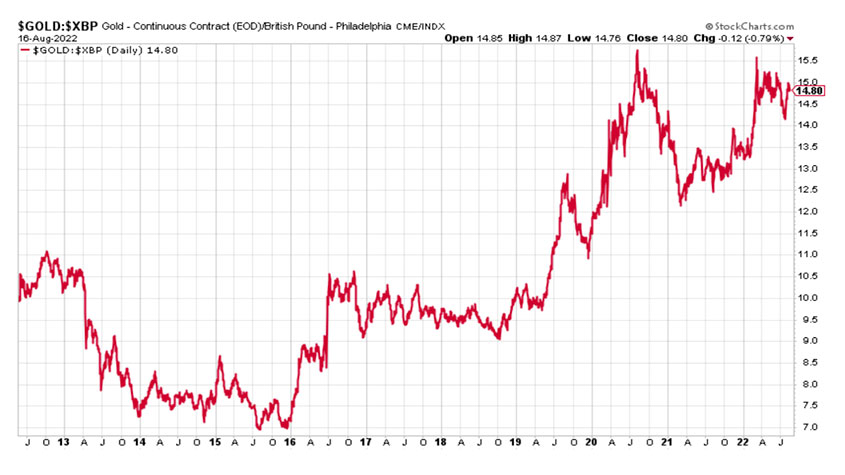
It was £700/oz in 2015. Today it’s £1,480. A double. It’s in a clear uptrend, and has been a good, low risk hedge against incompetent leadership and the incompetent management of the pound.
Regular readers will know my ambivalence towards silver. It’s the metal that promises everything and delivers nothing. Here, for reference – not recommendation – is silver in pounds over the same period.
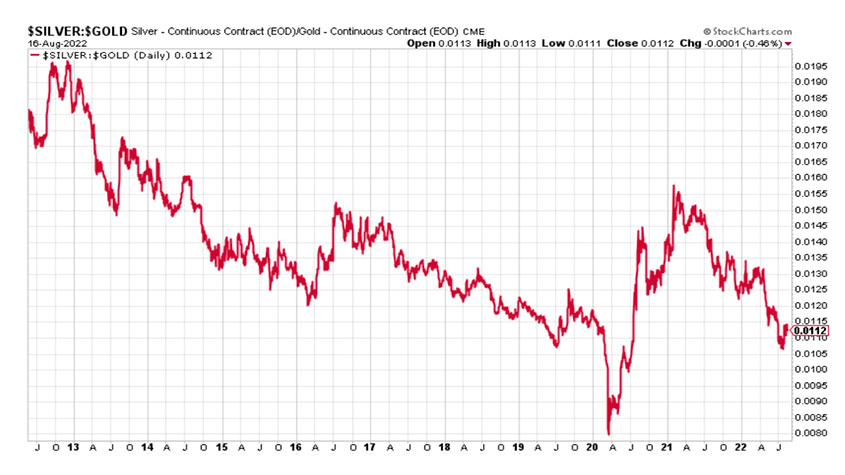
This one’s in a clear downtrend.
Coming back to gold, you can see how gold has been making a series of higher lows – since 2015 in fact. Each sell-off comes to an end at a higher price than the last.
Even since 2021 this has been the case. The current sell-off since the spring Russia’s-invasion-of-Ukraine-high has been painful. But the low in July was higher than the lows in January. That is long-term bull market action.
My concern looking at that chart is a potential double top just above $1,550. Maybe it all ends there. Maybe it has already ended there.
But while this sequence of higher lows continues – and looking at the mess around me – I am going to give the bull market the benefit of the doubt.
Self-inflicted or not, the Bank of England is caught between a rock and a hard place. It’s damned if it puts up rates and it’s damned if it doesn’t. It’s going to have to. Looking forward to the winter, it’s easy to see a host of problems – energy shortages, more Covid, further escalation in Ukraine, squeezed citizens, no end of political discontent.
I don’t know where all this ends. Often I can see where stuff is going, but this I can’t without getting shudders. We’ll find a solution. We always do. We are human beings, we work, we create, we innovate, we solve problems and life gets incrementally better. But it feels like we are early- to mid-series rather than going into the final episode.
So my advice is to own some gold. I’m glad I do.
The maxim “put 10% of your net worth in gold and hope it doesn’t go up” applies.
Finally, here is gold in dollars, again for your reference.
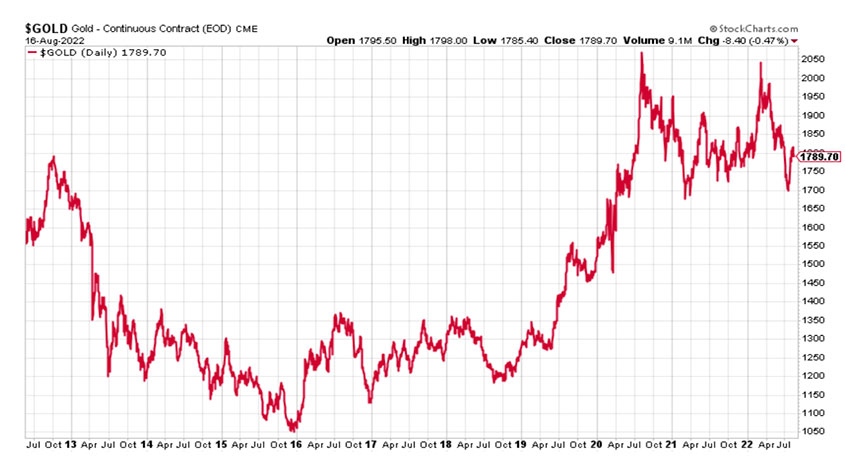
The bulls will want those lows around or just below $1,700 to hold – and for that to prove a double bottom. The bears on the other hand will want those highs around $2,050 to prove a double top.
For now it looks like we are range-trading between the two.
Get the latest financial news, insights and expert analysis from our award-winning MoneyWeek team, to help you understand what really matters when it comes to your finances.

-
 Should you buy an active ETF?
Should you buy an active ETF?ETFs are often mischaracterised as passive products, but they can be a convenient way to add active management to your portfolio
-
 Power up your pension before 5 April – easy ways to save before the tax year end
Power up your pension before 5 April – easy ways to save before the tax year endWith the end of the tax year looming, pension savers currently have a window to review and maximise what’s going into their retirement funds – we look at how
-
 The outlook for stocks is improving
The outlook for stocks is improvingThis is the best of times for investors, says Max King. Global risks are receding, but few have noticed.
-
 The building blocks for an income strategy: resilience, growth and diversification
The building blocks for an income strategy: resilience, growth and diversificationAdvertisement Feature Iain Pyle, Investment Manager, Shires Income plc
-
 Investment platforms offering measly interest rates on cash holdings – is your cash working hard enough?
Investment platforms offering measly interest rates on cash holdings – is your cash working hard enough?The interest rate on cash you hold within an investment account can be as low as 0.75%. We look at the worst cash rates on the market, and what you should do with your cash instead.
-
 Rethinking ESG investing
Rethinking ESG investingAnalysis Sustainable ESG funds are coming under attack for a lack of focus. Investors need to be selective
-
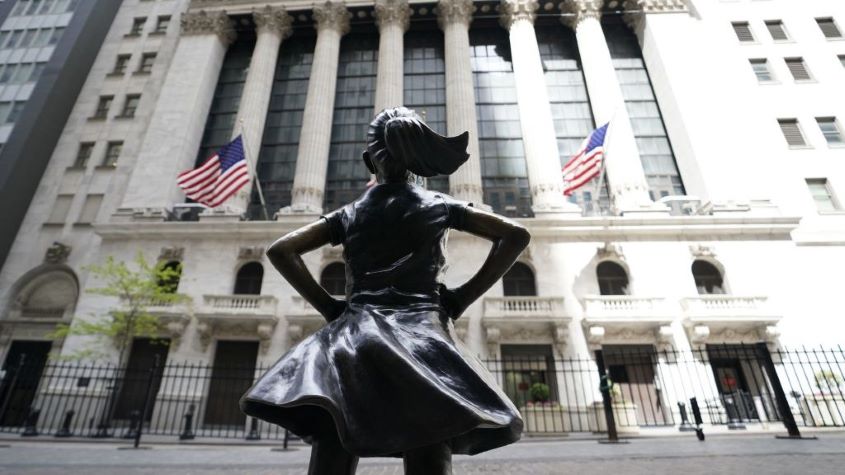 Can a woman deliver you better returns?
Can a woman deliver you better returns?Tips Women often make better stock pickers than men, delivering stronger returns for investors - but with fewer females managing funds, how can you make sure you take advantage of the feminist touch when picking funds? Kalpana Fitzpatrick on how to filter funds run by women and why it matters.
-
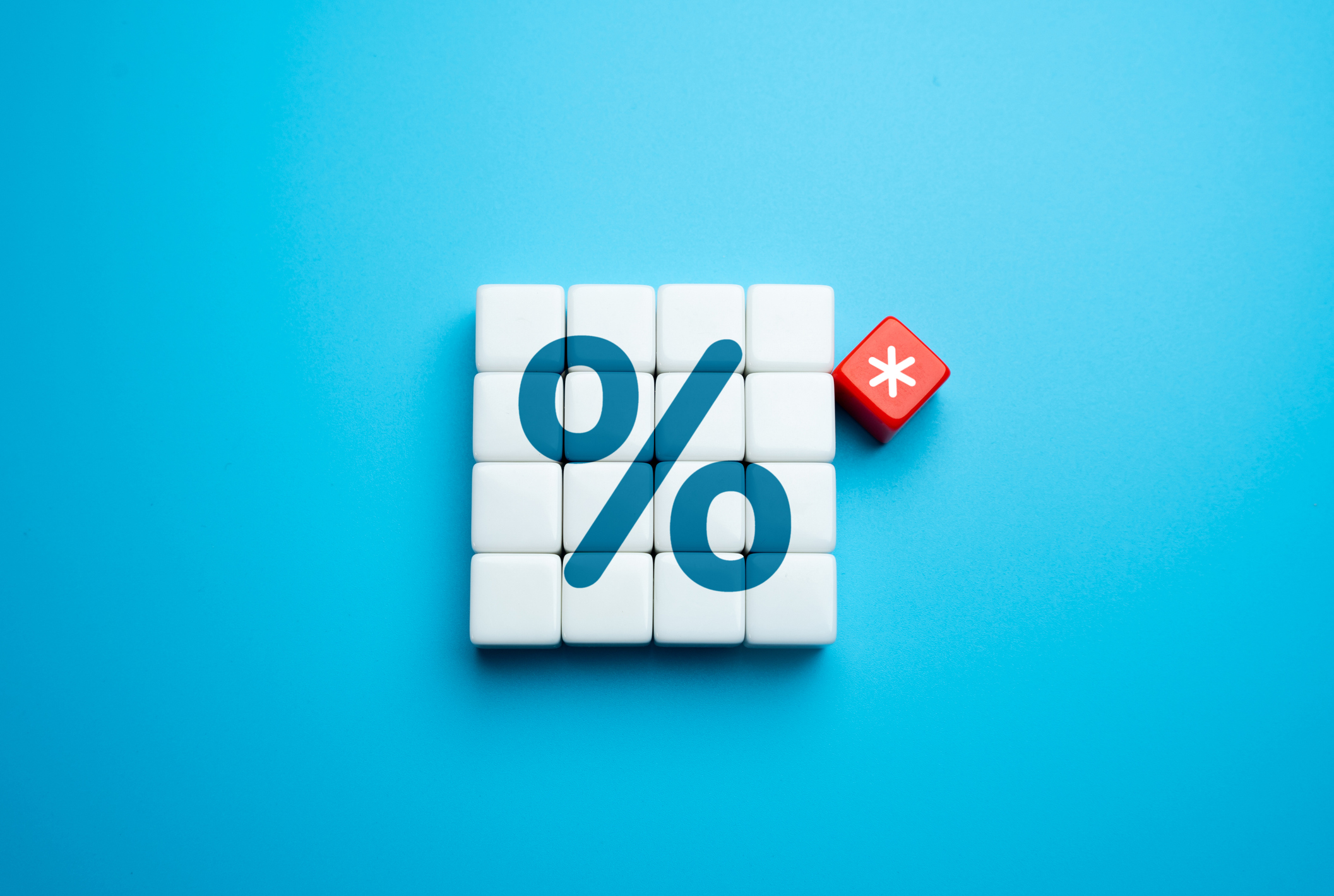 Flat fees vs percentage fees - are you paying too much for your investments?
Flat fees vs percentage fees - are you paying too much for your investments?We investigate whether it’s better to choose an investment platform with flat fees, or whether percentage charges could work out cheaper.
-
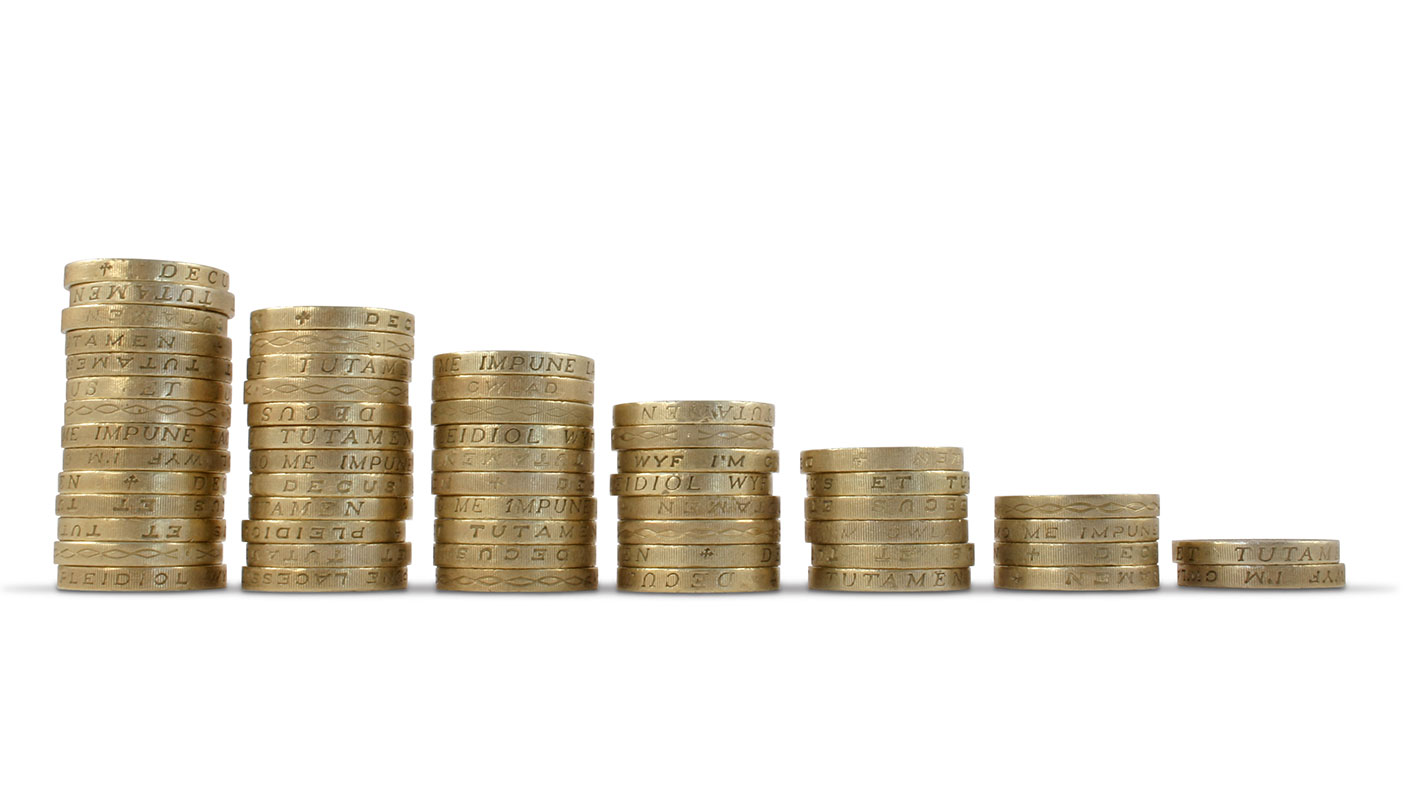 What is a dividend yield?
What is a dividend yield?Videos Learn what a dividend yield is and what it can tell investors about a company's plans to return profits to its investors.
-
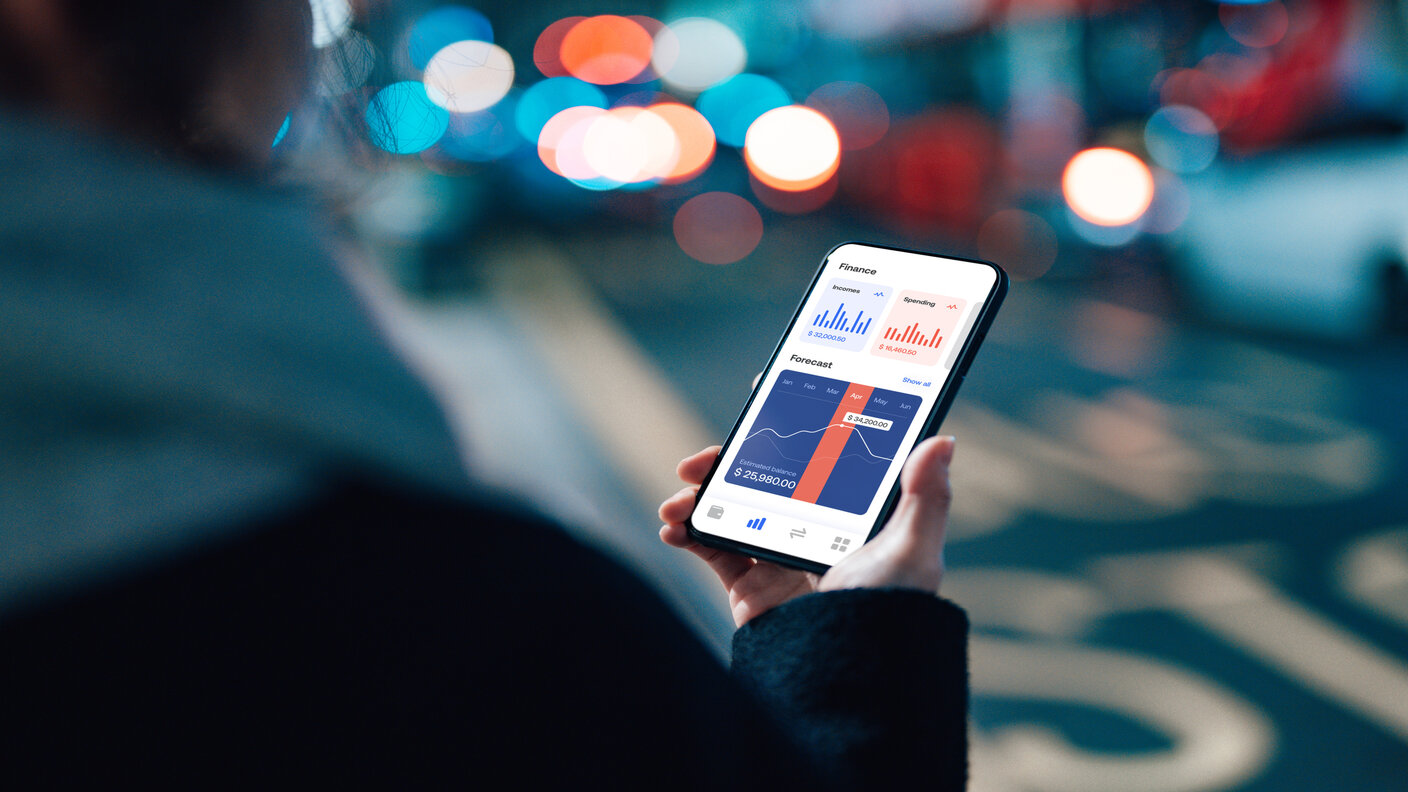 Fund platform launches low cost £4.99 a month service for small investors - we see how it compares
Fund platform launches low cost £4.99 a month service for small investors - we see how it comparesAdvice Aimed at investors with small investment pots of £30k or less, fund platform interactive investors has launched a low costs service - but is it any good and how does it compare to rivals?